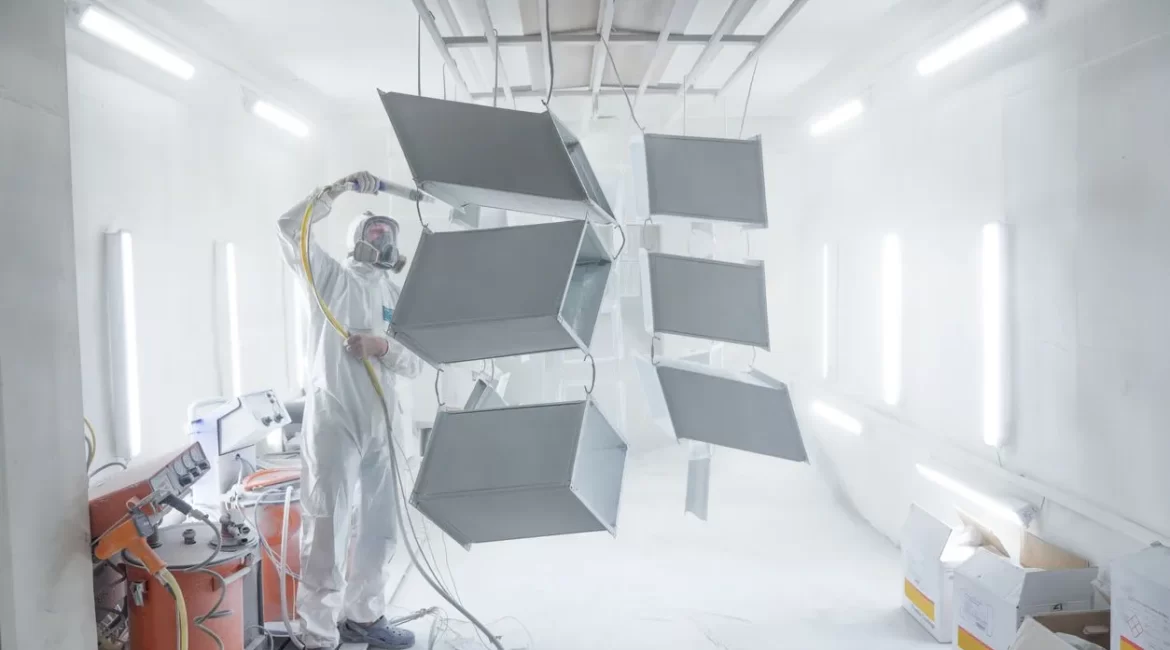In the world of spray booth filters, there are two popular choices: polyester and fibreglass. Suppose you’re faced with the decision of which filter to choose. In that case, it’s essential to understand the differences between the two options. Please stick with me as we explore the pros and cons of each to help you make an informed decision.
Understanding the Differences between Polyester and Fibreglass Spray Booth Filters
When choosing the right spray booth filter, understanding the differences between polyester and fibreglass filters is crucial. Let’s start by diving into the characteristics of these two types of filters.
Polyester filters are known for their excellent dust-holding capacity, making them highly efficient in capturing and retaining particles. This is particularly important in a spray booth, where the air needs to be clean and free from contaminants. The ability of polyester filters to effectively trap dust and debris ensures that the air in your spray booth remains clean, resulting in a better quality finish for your paintwork.
On the other hand, fibreglass filters are renowned for their low resistance, allowing for greater airflow. This means that fibreglass filters can provide better ventilation in your spray booth. The increased airflow not only helps maintain a comfortable working environment but also aids in the removal of potentially harmful fumes and odours.
Another significant difference between polyester and fibreglass filters lies in their construction. Polyester filters are made of synthetic fibres, carefully woven together to create a dense and efficient filtration medium. This construction allows polyester filters to effectively capture particles of various sizes, ensuring your spray booth remains clean and free from contaminants.
On the other hand, fibreglass filters are composed of glass fibres. These fibres are bonded together to form a sturdy and durable filter media. Glass fibres in fibreglass filters provide excellent chemical resistance, making them suitable for use in spray booths with exposure to various chemicals and solvents.
Furthermore, the composition of fibreglass filters also contributes to their high-temperature resistance. This makes them ideal for spray booths that operate at elevated temperatures, as they can withstand the heat without compromising their filtration efficiency.
Regarding durability, both polyester and fibreglass filters have their advantages. Thanks to their synthetic fibre construction, polyester filters are known for their long-lasting performance. They can withstand regular use and cleaning without significantly deteriorating their filtration capabilities.
Fibreglass filters are highly durable due to the nature of their glass fibre composition. The glass fibres provide strength and resilience, making fibreglass filters resistant to damage caused by handling or accidental impacts. This durability ensures that fibreglass filters can withstand the rigours of a spray booth environment, providing reliable and consistent filtration performance over time.
Whether you prioritise dust-holding capacity or increased air flow, considering these filters’ construction, performance, and durability will help you make an informed decision that aligns with your specific needs.
Factors to Consider When Choosing Between Polyester and Fibreglass Spray Booth Filters
Choosing the right spray booth filter goes beyond just understanding the materials they’re made of. It’s crucial to consider factors such as the desired level of filtration, the specific application, and the type of contaminants you anticipate encountering. Polyester filters are ideal for capturing fine particles, while fibreglass filters excel in applications where airflow is a priority.
You should also take into account the maintenance requirements of each filter. Polyester filters are relatively easy to clean, whereas fibreglass filters may require more frequent replacements due to their lower dust-holding capacity.
Analysing the Performance of Polyester and Fibreglass Spray Booth Filters
Regarding performance, both polyester and fibreglass filters have their strengths. Polyester filters efficiently capture fine particles, ensuring a cleaner and safer working environment. On the other hand, fibreglass filters excel in providing better airflow, which is essential for maintaining optimal ventilation in your spray booth.
It’s worth noting that the performance of both filters can be affected by external factors, such as humidity levels and the specific materials being sprayed. Understanding these variables will help you assess which filter will perform best in your unique circumstances.
Comparing the Durability of Polyester and Fibreglass Spray Booth Filters
Durability is a crucial consideration when choosing a spray booth filter. Polyester filters are known for their long lifespan and resistance to chemicals, making them a reliable option for many applications. While not as durable as polyester, fibreglass filters can still withstand moderate chemical exposure.
Ultimately, the durability of each filter will depend on factors such as the spray booth environment and the type of chemicals being used. Regular maintenance and cleaning can also extend the lifespan of polyester and fibreglass filters.
Cost Comparison of Polyester and Fibreglass Spray Booth Filters
Cost often plays a significant role in decision-making. Polyester filters generally have a higher upfront cost but offer longer-lasting performance, potentially offsetting the initial investment. On the other hand, fibreglass filters have a lower upfront cost but may require more frequent replacements.
It’s essential to conduct a cost analysis specific to your application to determine which filter option offers the most economical solution over the long term.
Pros and Cons of Each
Let’s summarise the pros and cons of polyester and fibreglass spray booth filters:
Polyester Spray Booth Filters
Pros:
- High dust-holding capacity
- Efficient in capturing fine particles
- Long lifespan
- Resistance to chemicals
Cons:
- Higher upfront cost
- May require regular cleaning
Fibreglass Spray Booth Filters
Pros:
- Low resistance and better airflow
- Lower upfront cost
Cons
- Lower dust-holding capacity
- May require more frequent replacements
- Less durable than polyester
Ultimately, the choice between polyester and fibreglass spray booth filters depends on your specific needs and priorities. Consider factors such as filtration efficiency, air flow requirements, maintenance demands, durability, and cost to determine which filter best suits your spray booth and provides optimal performance.
By thoroughly understanding the differences between polyester and fibreglass filters, you can make a well-informed decision and achieve the desired results in your spray booth. Happy filtering!
